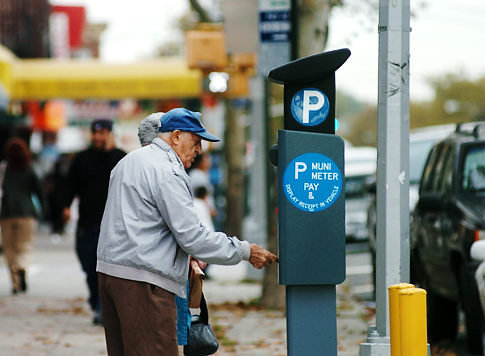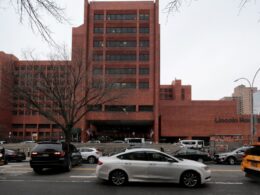Seeing the orange-and-white envelope sticking from my car’s windshield almost sent me into a rage. I had just come out of a lunch with a client and her friend and was about to give them a lift downtown.
Then I almost screamed, but instead muttered, “How could the [bleeping] traffic agent be so [bleeping] stupid? I just got a parking ticket for not displaying a receipt in my windshield!”
Couldn’t he see I was parked right next to a new Muni Meter machine? All it requires is that drivers input their license plate number — and specifically says there’s no need to display a receipt on the dashboard.
My brain did a quick calculation: how long would it take me to assemble the necessary evidence and challenge the ticket? I’d need a photo of the Muni Meter and a copy of my American Express statement showing the charge. Uploading those to the Department of Finance’s website would take 15 minutes, max. So, I decided to fight it.
That’s when I fell into the Alice-in-Wonderland abyss of NYC’s bureaucracy.
I sent in the evidence, waited several weeks, and then got an email: Guilty! An administrative law judge (ALJ) had reviewed my photos and scans and wrote a decision — replete with more typos than a C-minus student’s text to a BFF — that was shocking not for its brevity but its errors.
The most basic was the assertion that the photo didn’t identify the meter. Wrong. The photo included both the meter and the zone number. And the American Express statement — which he didn’t like either — showed a $13.25 payment on the same date as the ticket — to NYC and the exact same “Meter Zone” as on the machine. Huh?
There was one other reference on the decision which made no sense to me: “Flowbird records are reviewed and considered Guilty.” What in the world is Flowbird, I wondered. I’d find out a month later.
New York City has some 80,000 on-street metered parking spaces. To service those spots, the city has approximately 14,500 Muni Meters. And since May 2024, it has been replacing older meters that were first put in place in 1989 — following the city’s notorious Parking Violations Bureau scandal of 1986 that shook up the Koch administration.
The ostensible purpose of the new machines, which use what is known as pay-by-plate technology, is to save the estimated 2,500 miles of paper annually needed for the receipts that go onto car windshields proving the driver has paid. And the new machines can work with a phone app provided by — wait for it — Flowbird.
Giving out parking tickets for scofflaws who fail to pay is a big business. The NYPD employs some 3,300 traffic enforcement agents who write more than 1.2 million tickets (at around $65 each) annually for no-receipts; and another 1.9 million for street cleaning violations. Paying for those traffic enforcement agents is expensive: salaries — which start at $41,000 annually and rise to nearly $48,000 after one year on the job — and benefits cost the city about $247 million annually.
Following my guilty verdict, I decided to appeal. For the appeal, I assembled even more evidence: a sworn, notarized affidavit from the client who saw me pay, and a new series of photos taken of the same machine’s screen — at every step of the transaction. The last screen, about eight inches across and six inches high, says on a bright yellow background, “No need to display the receipt on dashboard.” This was going to be my vindication — or so I thought.
The panel of three appellate judges who I appeared before seemed unimpressed. I had to get on tip-toes to hand the photographs over a six-foot plexiglass divider to the presiding judge. And after another judge said, “The ALJ (the original judge) says he checked Flowbird and there is no record of your having paid,” I had to explain that I didn’t know what Flowbird was and didn’t use it; I inserted my Amex into the new machine. The presiding judge explained I’d get a written decision in about two weeks.
I did, and I lost three-to-zero. “We find no reversible error of fact or law.” That both the ticket and my American Express charge said Parking Zone 110517 apparently was insufficient. I paid the fine, but I keep wondering how many of those other 1.2 million Muni Meter ticket recipients were victims of errors. Did they have the good sense not to get swallowed up by the city bureaucracy? Or do they too wonder if this is just incompetence; or the latest iteration of a good old-fashioned parking scandal?
Cohen is an attorney at Pollock Cohen in NYC.








